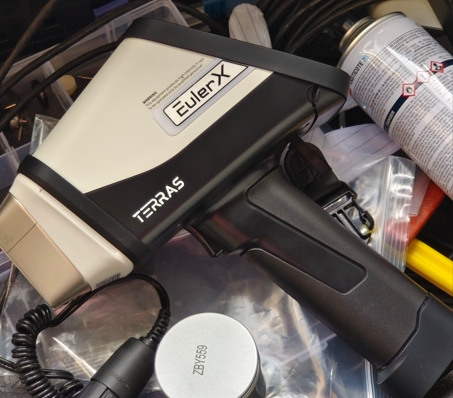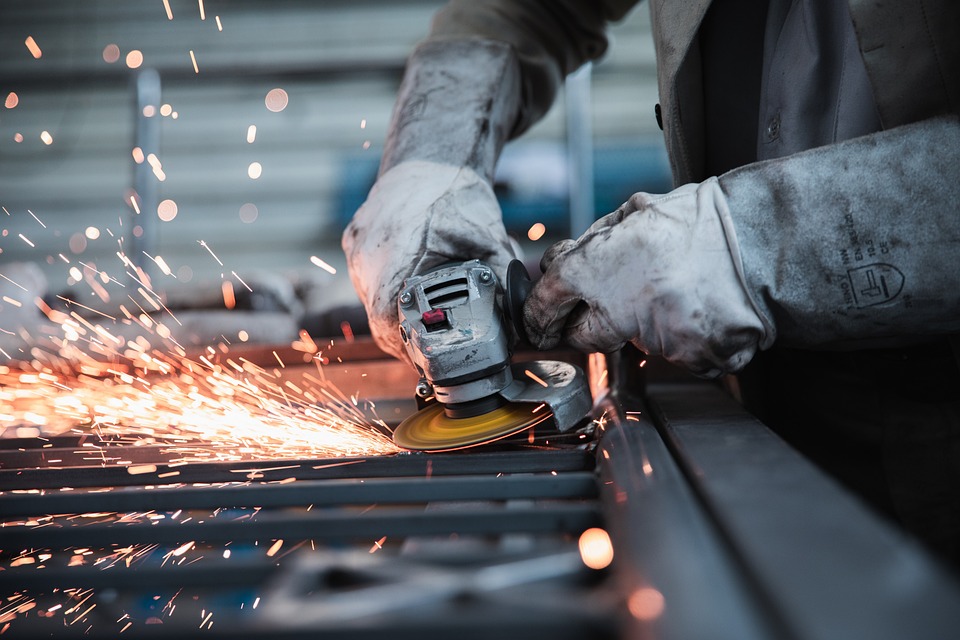
Positive Material Identification
A high-tech enterprise focusing on the development and application of X-ray technology products, committed to becoming a leading supplier of X-ray industrial testing solutions.
Handheld XRF Scanners in Scrap Metal Recycling: Enhancing Efficiency and Profit
The world of scrap metal recycling is constantly evolving, driven by both environmental considerations and the need for greater operational efficiency. Scrap metal recycling plays a crucial role in reducing waste, conserving natural resources, and contributing to a more sustainable economy. As industries seek to streamline their operations and maximize profits, technological advancements have made a significant impact in the sector. One of the most promising innovations is the handheld X-ray fluorescence (XRF) scanner, a tool that is transforming the way scrap metal is analyzed, sorted, and processed.

Terras EulerX900 Handheld Alloy Analyzer
What is Handheld XRF Technology?
X-ray fluorescence (XRF) is a non-destructive analytical technique used to determine the elemental composition of materials. In simple terms, XRF works by bombarding a material with X-rays and measuring the resulting secondary (or fluorescent) X-rays that are emitted. This process allows for a quick, accurate identification of the elements present in the material without damaging it.
Handheld XRF scanners are portable devices that use this technology to conduct rapid elemental analysis of various materials, including metals, alloys, and plastics. Unlike traditional lab-based analysis methods, handheld XRF scanners provide instant results on-site, making them a valuable tool in the fast-paced world of scrap metal recycling.
Key Benefits of Handheld XRF Scanners in Scrap Metal Recycling
Improved Sorting Accuracy
In scrap metal recycling, accurately identifying different types of metals and alloys is critical for maximizing value. Metals like copper, aluminum, steel, and brass need to be separated to ensure that they are processed correctly and sold at the best price. Incorrect sorting can result in contamination, leading to lower-quality output and reduced profitability.
Handheld XRF scanners provide rapid and precise identification of metal types, allowing recyclers to sort metals more effectively. The scanners can quickly detect the elemental composition of each scrap piece, ensuring that valuable metals are separated from less valuable or undesirable materials. This level of precision significantly improves sorting accuracy and helps reduce costly errors.
Faster Turnaround Time
Traditional methods of metal analysis often involve sending samples to a laboratory for testing, which can take several days. This delay can slow down the recycling process and result in lost time and potential revenue.
Handheld XRF scanners, on the other hand, deliver instant results, enabling recyclers to make immediate decisions about the value and composition of their scrap metal. This capability speeds up the sorting process, reducing turnaround times and increasing throughput. The faster you can analyze and sort materials, the more scrap you can process, leading to enhanced productivity and profitability.
Reduced Labor Costs
Manual sorting of scrap metal can be a labor-intensive and time-consuming process, especially when dealing with large volumes of material. Handheld XRF scanners automate a significant portion of the analysis and sorting tasks, reducing the need for extensive labor.
By using handheld XRF scanners, recyclers can streamline their workforce, assign staff to higher-value tasks, and ultimately reduce labor costs. These scanners also minimize the need for specialized staff with deep knowledge of metal types, as the scanners can provide detailed analysis with minimal training.
Higher Profit Margins
In the scrap metal recycling industry, profitability is largely dependent on how well materials are sorted and priced. Metals are sold based on their purity and type, with certain alloys fetching higher prices than others. Accurate sorting and precise identification of metal content can ensure that recyclers get the best possible price for their scrap.
Environmental Benefits
Efficient recycling not only leads to increased profits but also benefits the environment. Handheld XRF scanners help reduce the amount of contaminated metal that ends up in landfills or requires costly disposal. By ensuring that materials are properly sorted and processed, recyclers contribute to a more sustainable circular economy.
Moreover, the technology enables recyclers to more effectively reclaim precious metals from electronic waste (e-waste), which is an increasingly important aspect of scrap metal recycling. As e-waste contains valuable and sometimes hazardous materials, precise analysis ensures that these materials are handled correctly, reducing environmental risks.
Enhanced Compliance and Documentation
Scrap metal recycling operations must comply with various regulatory standards and documentation requirements. Handheld XRF scanners can store data on the analysis of each metal sample, providing recyclers with detailed reports on the materials being processed. These records can be valuable for both internal management purposes and regulatory audits.
Having access to precise and traceable data helps recyclers stay compliant with industry standards and legal requirements, avoiding fines or penalties. Additionally, the ability to provide clients with accurate reports on the composition of recycled materials can enhance trust and transparency in business transactions.

Terras EulerX900 Handheld Alloy Analyzer
The EulerX 900 series has proved to be an excellent choice for metal analysis in a wide fields, providing fast, accurate results directly to the user. Thanks to its cutting-edge electronics and sophisticated mathematical algorithms, the EulerX 900 series ensures superior measurement quality within seconds. The applications of the EulerX 900 handheld are extensive, covering not only solids but also liquids and powders. The EulerX 900 series handheld alloy analyzers are extensively utilized for alloy grade identification and quality control, scrap metal recycling, precious metals analysis, PMI, and more.
Conclusion
Handheld XRF scanners are revolutionizing the scrap metal recycling industry by improving sorting accuracy, reducing turnaround times, lowering labor costs, and increasing profitability. By providing instant, non-destructive analysis of metal composition, these devices help recyclers make more informed decisions, minimize errors, and enhance operational efficiency.
Join Us
Subscribe to our email list for updates & promotions.



